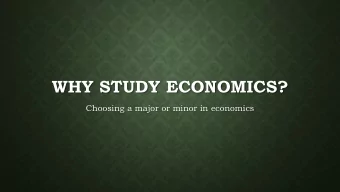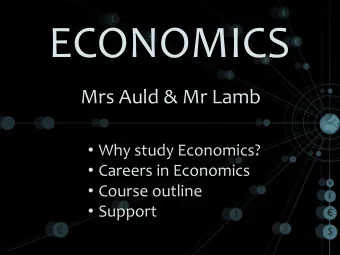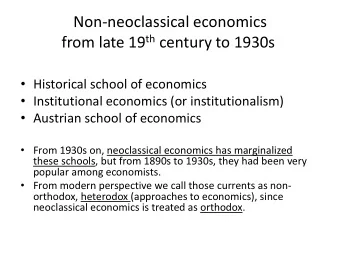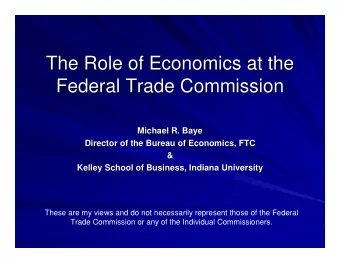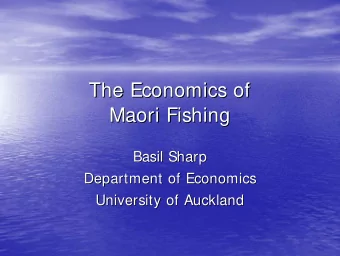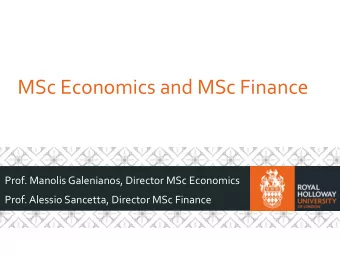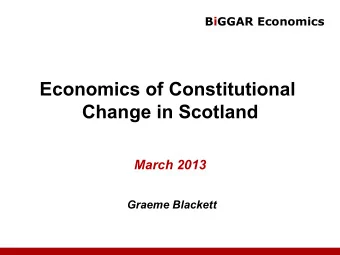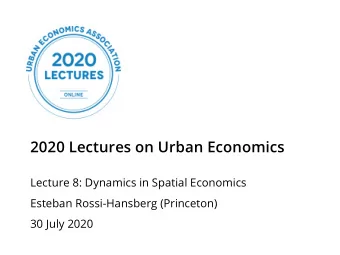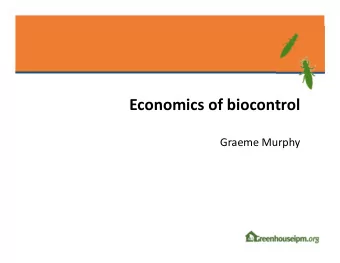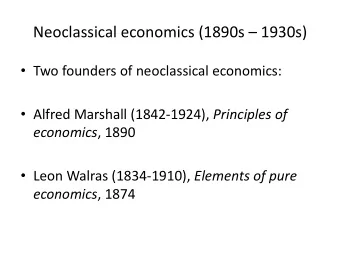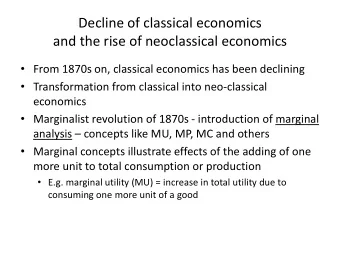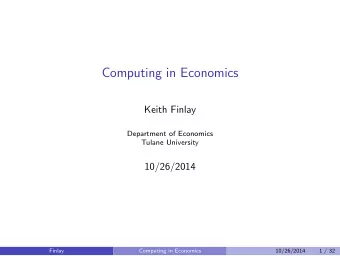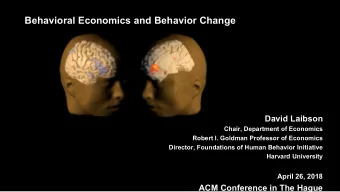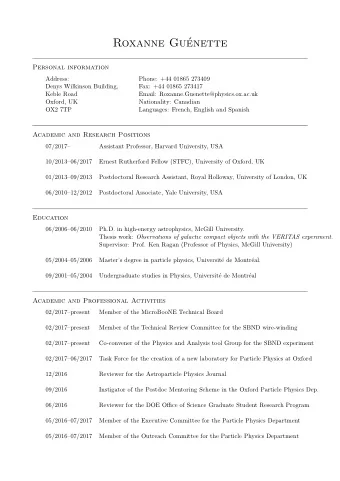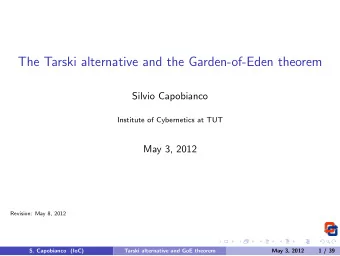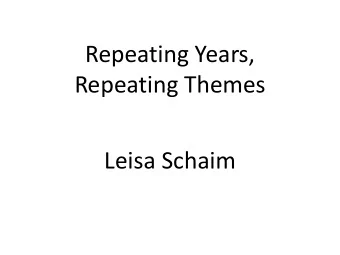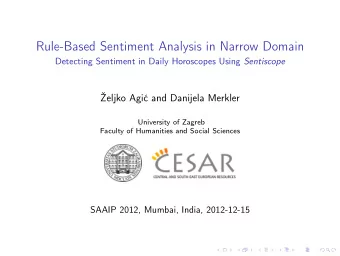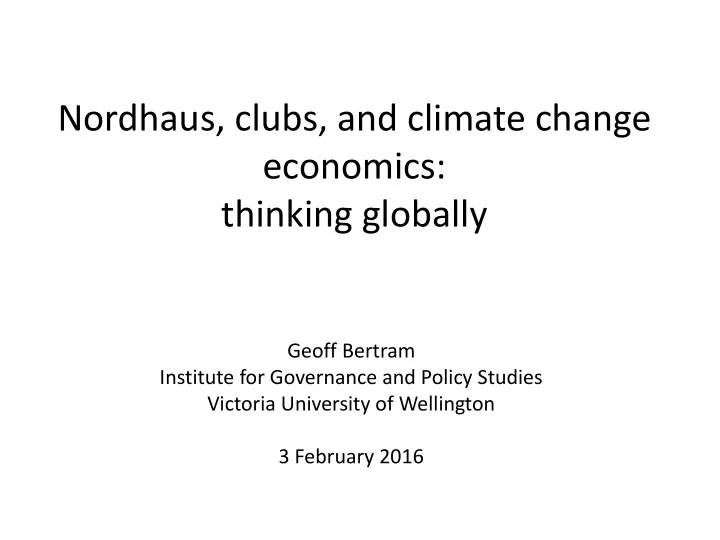
economics: thinking globally Geoff Bertram Institute for - PowerPoint PPT Presentation
Nordhaus, clubs, and climate change economics: thinking globally Geoff Bertram Institute for Governance and Policy Studies Victoria University of Wellington 3 February 2016 Some general propositions to start Thinking globally needs
Nordhaus, clubs, and climate change economics: thinking globally Geoff Bertram Institute for Governance and Policy Studies Victoria University of Wellington 3 February 2016
Some general propositions to start • “Thinking globally” needs to come before “acting locally” – especially with climate change • Paris 2015 has taken us back to Rio 1992 – so let’s learn from last time’s mistakes – specifically, free-riding and too narrow a choice set for policy • “Pledge and review” will fail because it does not remove the incentive for free-riding – even the Pope must contend with market forces 2 Geoff Bertram, Climate Change Economics
No world government – but most economists’ textbook “policies” need a legitimate, hegemonic policymaker and enforcer “ The approach [to global climate policy] taken thus far has been to set economy-wide targets and timetables. This approach would be ideal were it possible to regulate the world’s greenhouse gas emissions in top- down fashion. Unfortunately, however, the world’s governance arrangements have to work from the bottom up. The world does not have one government; it has nearly 200. An agreement to reduce emissions must not only be attractive from the perspective of the global good. It must also be something to which countries individually want to accede and to adhere .” Scott Barrett, “Rethinking global climate change governance”, Economics 3(5) March 3 2009, p.2. 3 Geoff Bertram, Climate Change Economics
Tragedy of the commons and free riding • Collective action is required in an individualistic anti-collectivist age • It’s economics, not ideology, that is the central problem • In a market economy, public goods are under- supplied, and public bads oversupplied, because individual incentives are to free-ride 4 Geoff Bertram, Climate Change Economics
Gollier and Tirol frame the issue: “Most benefits of mitigation are global and distant , while costs are local and immediate. Climate change is a global commons problem. In the long run, most countries will benefit from a massive reduction in global emissions of GHGs, but individual incentives to do so are negligible. Most of the benefits of a country’s efforts to reduce emissions go to the other countries. In a nutshell, a country bears 100% of the cost of a green policy and receives, say, 1% of the benefits of the policy, if the country has 1% of the population and has an average exposure to climate-related damages. Besides, most of these benefits, however small, do not accrue to current voters, but to future generations. Consequently, countries do not internalize the benefits of their mitigation strategies, emissions are high, and climate changes dramatically. ” Christian Collier and Jean Tirole , “Negotiating Effective Instruments Against Climate Change”, Economics of Energy and Environmental Policy 4(2):5-27, September 2015, p.6. 5 Geoff Bertram, Climate Change Economics
Three approaches to externalities • Harness market processes to bring individual incentives into line with the common good by pricing-in all externalities • Command and control: central authority intervenes to block or restrict market-driven threats to the common good • Some combination of those two => cap-and- trade? 6 Geoff Bertram, Climate Change Economics
How cap-and-trade came to dominate the policy menu • Global carbon tax ruled out by lack of world government and by moral hazard • Command and control is notoriously “inefficient” in economists’ eyes because it tends to miss the lowest -cost opportunities [but it works….] • Cap and trade uses the market to allocate a command- and-control cap, potentially overcoming that source of inefficiency while looking “elegant” to economists. – But with hindsight, the crucial problem was and is how to set and enforce the cap 7 Geoff Bertram, Climate Change Economics
My own version (1992 vintage*) • Allocate emission permits per capita to the world’s population • Each permit denominated as that individual’s share of global total emissions • The market price balances – tightening cap (=> higher price) – technological progress (=> falling price) • Central problem is distributional consequences: the rich have to pay the poor * ‘Tradeable Emission Permits and the Control of Greenhouse Gases’, Journal of Development Studies , 28, 3 (April 1992) pp.423-446, reprinted in T. Tietenberg (ed.) The Economics of Global Warming (Cheltenham, UK: Edward Elgar, 1997). 8 Geoff Bertram, Climate Change Economics
My wild over-optimism (1992 pp.435 and 440): “… the peoples of the rich countries have a large stake in protecting the global environment, which might well outweigh political pressures from powerful industry lobby groups. ” “The world community faces an historic chance actually to achieve the development goals to which so much lip service is paid on the diplomatic circuit, as a by-product of that community’s willingness jointly to confront the greenhouse issue. The developing countries deserve no less than full partnership in this process. If full partnership is denied them, they have the ability credibly to threaten ecological disaster. Prudence, as well as benevolence, should prompt the rich to tolerate economic redistribution on a very considerable scale. ” 9 Geoff Bertram, Climate Change Economics
My unfortunate prescience (1992 p.440): “If the opportunity is lost to tackle development and sustainability as simultaneous parts of a joint problem, then the global outlook darkens seriously. Either the greenhouse effect could be held at bay by condemning the poor countries to long-term underdevelopment; or the South might grow for a generation or two without regard to the environmental consequences, exposing the entire global community to the risk of catastrophic climate change .” 10 Geoff Bertram, Climate Change Economics
How and why I (and a lot of other economists!) got it wrong • Too optimistic about the ease of establishing and enforcing a single global cap – Without that, we were left with the Kyoto morass of individual country targets with free-riding incentives • Incomplete listing of the options for organising a global policy regime 11 Geoff Bertram, Climate Change Economics
My 1992 list of 4 supposedly exhaustive options 1. Direct regulation: transparent and certain, but – administratively costly – hard to harmonise across many countries/jurisdictions – hard to enforce effectively (in the absence of a world government) 2. Carbon tax: the textbook answer, but – would have to be specified in some currency => exchange rate issue – no global authority exists with the mandate to impose the tax – revenues on a huge scale present a moral hazard problem Private litigation: the initiative would lie with individuals, agencies and 3. companies around the world to sue polluters through the courts of each country, but – wealthy polluters could stall litigation indefinitely – unclear what sanctions courts could impose – loss of sovereignty as each country faced having its courts invaded by non-residents 4. Tradable permits: judged best if done as laid out in the paper, even though – big wealthy polluting countries have to swallow large wealth transfers to poor ountries – attempt by large vested interests to capture the scheme by seeking grandfathered permits would have to be defeated. 12 Geoff Bertram, Climate Change Economics
The big missing option: a global price without a carbon tax • Problems of implementing a global tax were allowed to sink the direct-pricing option • Cap-and-trade was a fallback attempt to get a global price – but failed for the same reason the carbon tax did: no world government to set and enforce the cap • Nordhaus’s new (2015) insight: an international carbon price can be set and enforced bottom-up by a “climate club” 13 Geoff Bertram, Climate Change Economics
Club theory • Private goods: excludable and rival – baked beans, petrol, an overcoat • Public goods: non-excludable and non-rival – roads, defence, sunshine • Club goods: excludable but non-rival – golf, movies, TV sports coverage, uncongested toll roads • Climate change is a pure public bad (negative good) => club option works if excludability can be achieved – i.e. if free-riding incentive can be eliminated 14 Geoff Bertram, Climate Change Economics
Four types of economic goods (or bads) Contents of a typical supermarket Municipal swimming pool, golf links, Sky TV, public transport) 15 Geoff Bertram, Climate Change Economics
Four types of economic goods (or bads) Contents of a typical supermarket Municipal swimming pool, golf links, Sky TV, public transport) 16 Geoff Bertram, Climate Change Economics
Four types of economic goods (or bads) Contents of a typical supermarket Municipal swimming pool, golf links, Sky TV, public transport) Coase (1960) framed these as a matter of poorly defined property rights, which gave ‘legs’ to cap -and-trade 17 Geoff Bertram, Climate Change Economics
Four types of economic goods (or bads) Contents of a typical supermarket Municipal swimming pool, golf links, Sky TV, public transport) Identified by Buchanan (1965) as a Coase (1960) framed these as a matter of sub-type of public goods poorly defined property rights, which gave ‘legs’ to cap -and-trade 18 Geoff Bertram, Climate Change Economics
Recommend
More recommend
Explore More Topics
Stay informed with curated content and fresh updates.
